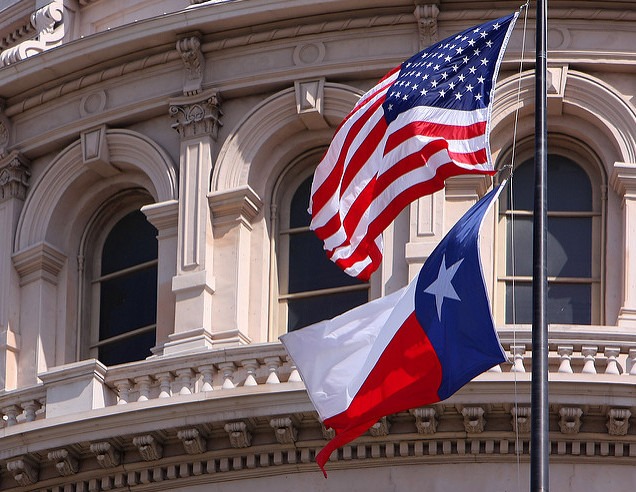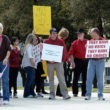Photo Credit: Jack
Tuesday, March 1, is election day in Texas. If you vote in the Democratic primary, your choice for the presidential nomination is not just between Hillary Clinton and Bernie Sanders. There are six other candidates on the Democratic ballot, three of whom are Texans: Calvis L. Hawes, of Hawkins; Star Locke, of Port Aransas; and Keith Judd, of Midland. If you are a Republican, in addition to the candidates you have heard of, Ted Cruz, Marco Rubio, Donald Trump et al. (Carly Fiorina, Jeb Bush, Chris Christie and others who have dropped out are still on the ballot), there is Elizabeth Gray, of Taylor, Texas.
Who are Elizabeth Gray and the three Democrats from Texas who want to be our president? It seems that Gray is a total mystery. Rick Adams, who writes a blog called “lovinglifeineurope” and describes himself as “mildly obsessed” with learning about her, says that neither the editor of The Taylor Press nor the Republican chairman of Williamson County knows anything about her except that she apparently had the $5,000 needed to pay the filing fee. She is evidently a phantom candidate.
The same can be said of Calvis L. Hawes. Jacqueline Sarkissian, a reporter for the CBS affiliate in Tyler, Texas, went looking for Hawes, couldn’t find him, and learned that none of his neighbors know that he is running for president. Hawes later told the station in a telephone interview that he was dropping out of the race because he “needed to concentrate on other things right now.”
On the other hand, it is easy to learn about Star Locke, a Port Aransas, Texas, homebuilder who has posted an 18-page illustrated biography at StarOverTexas.com. Locke, whose real name is Robert, says he got his nickname from John Wayne after clobbering an overbearing bartender in a border town cantina that Wayne, Happy Shahan, and Slim Pickens were patronizing at the time. According to Locke, Wayne stood up, shook his hand, and said, “I see there is still a star over Texas.” The rest of the bio makes equally interesting reading. Locke has previously run for Congress and for governor in Republican primaries, but he has decided to switch parties this year.
Keith Judd is a convicted felon who served 14 years in the penitentiary and, according to Wikipedia, has run for president in every election since 1996, as well as for governor of New Mexico and mayor of Albuquerque. My advice is to stick with the mainstream candidates.
In Texas, anyone who can pay the filing fee can get on the ballot for any office, if they meet the basic qualifications. I once encountered Johnnie Mae Hackworth (who called herself “the Prophetess of Brenham” and was a frequent candidate for office in the 1960s) in the State Democratic Executive Committee office in Austin trying to persuade Pat O’Quinn, the executive secretary, to accept a registered Hereford bull in lieu of the filing fee for governor.
The Texas election that holds the record for the most candidates for one office is a special election held in the spring of 1961 to fill Lyndon Johnson’s Senate seat after Johnson was elected vice-president. The filing fee was $50 and 71 names appeared on the ballot, including that of a friend of mine, Johnny Oakes, who was a first-year law student at the University of Texas. Johnny’s campaign cards identified him as “The Marksman of the New Frontier.” Another candidate was a gentleman in Corpus Christi named Delbert Grandstaff, whose platform was that he was Bing Crosby’s father-in-law. Because it was a special election, only the candidates’ names, and not their political parties, appeared on the ballot. A professor named John Tower, from Midwestern State University in Wichita Falls, won the election and became the first Republican Senator elected in a Southern state since Reconstruction.
The 1961 special election was the result of a peculiar law passed by the Legislature in 1959 at the request of Senator Lyndon Johnson, which permitted a candidate to run for more than one office on the same ballot. In the 1960 election Johnson ran for both vice-president and for re-election to his United States Senate seat, giving his opponents the opportunity to produce bumper stickers reading “Scratch Lyndon Twice.” He won both offices and then resigned his Senate seat. Senator Lloyd Bentsen availed himself of the same law in 1988 when he ran for vice-president with Michael Dukakis and for reelection to the Senate. He lost the vice-presidency to Dan Quayle but was re-elected to his Senate seat.
Some of the hardest-fought elections in Texas have not involved candidates but the sale of alcoholic beverages. Texas’s local option system, which dates back to 1891, means that any county, municipality, or even justice of the peace precinct can hold an election to create local prohibition. Historically, this meant that areas with large Hispanic, German, and Czech populations were wet and areas with large Baptist and fundamentalist populations were dry. The old saying was that in local-option elections the bootleggers drove the Baptists to the polls, as they had a congruity of interests. When I lived in the German community of Round Top, in Fayette County, a traditionally wet area, there was a story that back in the 1920s the Baptists had gathered enough signatures to call a local-option election for the whole county. The teller was pulling the paper ballots out of the box in Round Top and reading them to the election judge. The first 30 ballots were marked wet; suddenly the teller came to one marked dry. “Put that one aside,” the election judge said. The teller read 30 more wet ballots and came to another one marked dry. “That son-of-a-bitch voted twice,” the judge said. “Throw them both out.”
It was also in Round Top that old-timers remembered a story about an old man who, in the early 1900s, would gallop his horse around the town square on election day, waving a bottle of whiskey and shouting “Sink or swim, live or die, I’m for the Old Log Cabin!” a slogan from the 1840 election, when the Whig Party proclaimed William Henry Harrison the log cabin candidate to emphasize his common touch. Political loyalties die hard in Texas.
The polls are open today, tomorrow, and next Tuesday. Texans can select a Republican or a Democrat—and even, for all we know, someone living in an old log cabin.
Lonn Taylor is a historian and writer who lives in Fort Davis, Texas.







Lonn Taylor, the best in far west Texas. Dear Friend, fellow Congregant, near neighbor who wrote the Foreword for my latest book. Bless you, Lonn. Another great article in a line of many.